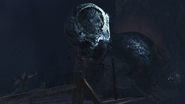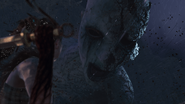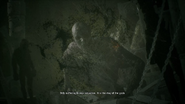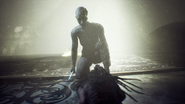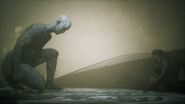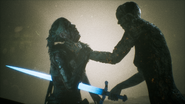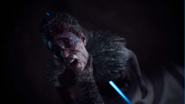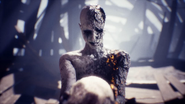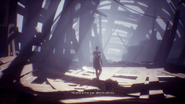- "The world of the dead is ruler by the giant Hela, daughter of Loki. The gods feared her bloodline; bad on her mother’s side and yet much worse on her father’s. So, as a child, the All-Father cast her down into Helheim and gave her power over those who die of sickness, age, hardship, and self-slaughter. In all of the nine worlds only Hela can resurrect the dead. To Hela your Dillion was sacrificed, and with her you must bargain.."
- Druth to Senua
Hela is a Norse goddess who rules over the realm of Helheim, the Norse underworld. A being that has power over the souls of those who died from sickness, age, hardship, and suicide, she is the only one who is capable of resurrecting the dead. It is to her domain that Senua journeys in the hopes of bargaining with her to win back Dillion's soul.
Appearance[]
Hela appears as a towering giant of a woman, naked and bald with eyes of darkest black. Her right side is bare and pale, covered in Norse Runes whilst her left side is rotten and charred, taking on the appearance of charcoal.
Hela can sometimes appear a dark shadow and is always foreshadowed by a distorted female voice, humming a mournful song. She occasionally speaks with the Shadow's voice, hinting at her true nature to Senua.
Hellblade: Senua's Sacrifice[]
After being told of the Northmen's legends by Druth and witnessing the murder of Dillion, Senua becomes convinced that the only way to save Dillion's soul is to bring his head before Hela in her sanctum and bargain with her for his release.
Upon first reaching the locked gate to Helheim, Senua is drawn into Hela's shadows. She realizes who she is speaking to and begs Hela to let Dillion go, offering to give her what she wants. As Senua reaches to touch the goddess, she is suddenly shot back to reality as her arm becomes infested with decay thanks to the power of the dark rot.
After vanquishing Surtr and Valravn to unlock the gate to the Bridge, Senua is frozen with fear as the doors to Helheim open and Hela's darkness spills out. As the giant goddess begins to emerge and Senua's voices overwhelm her, the Pict charges forward in an attack, but is easily batted away by Hela and sent falling into the abyss below.
After Senua is able to reforge Gramr and makes it into Hela's sanctum, defeating Garm in the process, she remembers the truth about her mother's death. As the goddess taunts her with the Shadow's voice, Senua, revealing that Hela is a manifestation of her own inner darkness, charges forward. She vanquishes an initial onslaught of Northmen brought before her, as well as a shadow taking the forms of Surtur, Valraven, and Garm. As Senua reaches the platform that Hela is standing on, Hela's giant form shrinks to normal human size as Senua, signifying how the years of abuse she has suffered at the hands of her father hold no power over her. Hela then summons an infinite amount of Northmen, and watches as they eventually overwhelm and strike down Senua.
Hela approaches a severely wounded Senua, kneeling down to take her sword from her. Senua realizes that if her condition was not a real darkness as her father said, then Hela is not real either and therefore she cannot save Dillion's soul. But she clings desperately to the fantasy, offering up her own soul in exchange for Dillion. Hela does not respond and Senua simply says that she should kill her instead because she has nothing left. Hela obliges, running Senua through with her own weapon.
As Senua dies, Hela takes Dillion's head and walks to the edge of her Sanctum. She drops it into the white abyss below and as the camera pans back, Senua has taken Hela's place. With the stigma of her condition no longer holding her back, Senua bids goodbye to Dillion and leaves.
Lore[]
In Norse mythology, Hela is a daughter of Loki and is described as having been appointed by the god Odin as ruler of Helheim, located in Niflheim. Her appearance is described as half blue and half flesh-colored and further as having a gloomy, downcast appearance. The Prose Edda details that Hel rules over vast mansions with many servants in her underworld realm and plays a key role in the attempted resurrection of the god Baldr, a story told by Druth in the Lorestones.
Powers[]
- Immortality: Hela, as a Norse goddess who rules over the realm of Helheim, is immortal, having lived for many millennia. Only a sufficiently powerful weapon or an extremely powerful being like Senua can kill her.
- Superhuman Strength: Hela's strength greatly exceeds the normal human being, as she can easily lift Senua with one hand by her neck, while impaling her with the Gramr.
- Darkness: According to the Shadow, Hela is the source of the darkness.
- Destrutive Scream: Hela is able to release a very powerful sonic scream, which can cause an immense wave of destruction.
- Summoning: In the final battle, Hela was able to summon every known enemy Senua has fought in the entire game.
Gallery[]
Trivia[]
- The ending scenes of the game and the way that Hela speaks with the Shadow's voice implies that Senua's journey has been a personal one, brought to life by her psychosis. By defeating Hela, the manifestation of her inner darkness and accepting Dillion's death, Senua is able to move on from her tragedies and accept her condition as part of herself rather than as a curse or a darkness.




